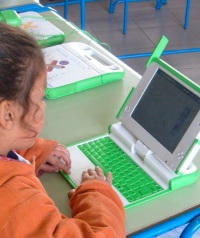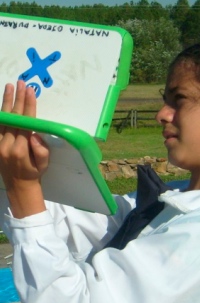Let me tell you about a great friend, someone I have never met in person. As far as education administrators in her country see things, she's just one of many, among over 14.000 classroom teachers in Uruguay that have been handed an XO laptop. She actually uses it, in the classroom, for classroom work.

Rosamel, a teacher in Durazno, Uruguay
Rosamel is what we wish every teacher involved with XO deployments were: ready to learn, ready to try, and what makes a lot of difference, ready also to share her experience. It also helps she doesn't give up easy, and together with several teachers and volunteers in Uruguay, that she does not expect to be handed the solutions to all the issues she faces.
Among the less than 1% who actually did get connected to international community collaboration for this project, from all grownups given XOs there these two years, she has already shown both her willingness to ask questions, to answer questions asked by newer arrivals to the Castillian list, OLPC Sur, and also to do her own research and publish it, besides being active, as a volunteer and plain member, in the list governance, and several other initiatives linked to Ceibal. While full time teaching, of course.
Her blog tells us about her most recent "Eureka" moment. As a dedicated professional (she describes herself as a "vocational teacher"), it is clear she understands the difference between 'teaching', and 'learning'.
There she tells us her adventure:
"That day, listening to Master Charles [Soarez], I took as my own the relationship I wanted to apply, show, illustrate in the classroom to the children, something that with the blackboard, chalk and notebook you simply cannot. Something that even though children see directly as a fact, it does not end up in reflecting on it. (why reflect on it?)
They could see it in the school kitchen, if any, and then move to the drawing, as a representation, through etoys and its animations. That was very clear to me, but I didn't know how.
So today, when I managed to make move the steam I had drawn, exiting the kettle, to use when working in the class about States of Matter, heat as the variable, water vapor in this mixture we call air ... I celebrated and just missed jumping with joy!"
Jumping with joy
Us too. Some say that "Once you give them a computer with Internet access nothing can fail", yet many of us believe it's the teachers that will make the difference, while the internet is probably going to cancel out, by far, any gains it gives directly, because of its effect as a distractor. (the Slate Romania $100 distractor link here)
We need, desperately, curriculum content that is relevant and localized, in sum, something children and especially teachers can use, because the teachers who were given this mandate were not given the tools to carry it out.
We celebrate with Rosamel, and with all the "Rosamels" that must be out there, able to contribute in making sense out of this project. In this context and in the little time left, before a change in government next year might add worse hurdles than any we have seen so far, and with all due respect for those volunteers already doing all they can, we cannot count just on early adopters that find us and sign up.
At the very least we need policies from up high (Miguel, are you there?) to find these early adopters and encourage them. Actually, we need to go further. We need to empower all common teachers, the ones that, like Rosamel felt a few days ago, are worried they "may take 20 years" to make any sense of this, especially those who don't give up.
It might be harder to work with those who "were upset because they didn't understand a thing!", but even then, those could be able to use the stuff that others have put together. I am sure that the First Grade ones, who already saw the possibilities for Etoys to tell stories, would be happy to use curriculum-related resources, if they were available.
Collaborating
Kay, Bender, Negroponte, and many others who visit OLPCNews are probably right in saying that collaboration is among the brightest promises OLPC can offer. The fact that so far official OLPC policies and action have not encouraged collaboration has not stopped a few volunteers to try their best.
Among what makes us human is the ability to learn from others. Having to explore, rediscover and reinvent everything is outrageously silly. Through collaboration we could instead break the barrier of just learning from the people in front of us, and by learning from others anywhere go beyond what earlier generations of humans could. Move over, Nietsche.
Rosamel mentions learning from Lino Bessonart, another amazing Uruguayan, probably in person. From the context in her blog it just seems that her learning from Prof. Soarez happened through online tutorials. Great! The Tool Is The Message! Then I get to learn from her, thanks to the Bolivia list where she published her comments, and Sammy Boutayeb picks up from the same list and hands it to others through the OLPC France blog.
Sammy is well respected and read many places, not the least Haiti and Madagascar. It certainly is a circuitous route, but somehow it might help someone, somewhere far away, have her own Eureka moment, and then not to feel afraid to share it. Educator-driven development is possible, but it needs a little help.
Freedom from Fear - Freedom to Learn (and Teach and Share)
Teachers everywhere have had the fear of administrative wrath instilled early and well. They better do what they are told, now, no questions, or worse, opinions, or probably lose their chance to move up in their career. Initiative might be something we talk about a lot, OLPC side, but who knows why, we fail to implement or encourage.
Thus the obvious results: a couple years into the enterprise and bleeding, collaboration has barely picked up among actual users, so far mostly in brilliant individual performances that are hard to replicate and even harder to scale up. Is it enough that we don't forbid people to participate? Sorry, that is way, way not enough.
To change patterns where speaking up has been so far seen as a major no no, we need to encourage people. We need, sometimes, to connect them ourselves proactively, because the fact is most don't know how to (circular thing, you know, if you are not welcome and comfortable already in the tools of collaboration, how will you ever feel you need them, much less own them?).
A Yamaplos Recipe:
- sign up people, everyone within reach (giving them an "opt out" is common decency)
- welcome them to participate ("seeding" the discussion with questions, very simple at first, trying to encourage the early adopters, etc. Just saying "now talk!" won't do)
- step back and be amazed (some patience needed - not included)
Some early adopters will show up first - the kind of people that dare. Then, hopefully, masses will turn things into a factory of knowledge, as Rosamel tells us in a later message.
To sign up to Sur | To sign up to OLE Bolivia
Both lists are in Castillian, all are welcome.
BTW, you may meet Rosamel, and Miriam, and 7 other teachers from Uruguay presenting at Squeakfest Brazil, July 23-25




"The fact that so far official OLPC policies and action have not encouraged collaboration has not stopped a few volunteers to try their best."
As Yama knows, at Sugar Labs we are looking for concrete ways to enhance the level of collaboration and communication between developers and teachers. Any suggestions are welcome!!
“at Sugar Labs we are looking for concrete ways to enhance the level of collaboration and communication between developers and teachers. Any suggestions are welcome!!”
Then I’ll give it a try…
FOSS developers/project care about/listen to users that know how to interface with the developer world. Teachers on the other hand can tell you what they would like to teach and maybe how. In most cases however, they are trained to follow strict guidelines on “what” and a specific tradition of “how”, so may not even volunteer this information. So if the initiative is left to the teachers and/or developers, direct interface can only be limited and spotty at best.
What is needed is an “interface team” that will go ASKING (groups of) teachers what specifically they would like to teach, what kind of material they could provide, what kind of defined goals or tests they have for the class and if they have any idea on how a computer (or Sugar in particular) may help them.
They must have the technical knowledge then to formulate ideas or request in a language that developers can “understand”. E.g. file bug reports, or feature requests for existing activities or Sugar, or draft activity proposals for a new activity/infrastructure in a developer-friendly form and if possible adapt it to Sugar principles (constructivism, collaboration etc).
They should NOT do the development themselves (it bias the user input) but they should be able to do/help the alpha-testing.
This might exist in some form already but I think the _key issue_ is that the initiative for the contact should lay in an “interface team” that should go “hunting”, and not the teachers or the developers.
Should be local or on location and the interaction with the teachers should be face to face (that’s the way teachers communicate best, by trait).
Should try to organize meetings at school level, having a couple of XOs and/or SoaS-enabled netbooks for an exhibition or visit deployments, and have a predefine but unbiased questioning outline that should trigger input.
Should be a group with characteristics from the Education-, Deployment-, Marketing-, Design Team and Bug squad and certainly the ability to communicate effectively with all of these teams.
Is short the goal of these team(s) is to extract/stimulate user/putative-user input in personal contacts and direct it to the appropriate channel for action. Like a front-desk that is not waiting for the customers but it goes to them.
I guess the last point is how do you find the people for these teams and how to you keep them active and productive. Here comes the work of all the other teams. These people must have the sense that they can make a difference. E.g. that their (the users’) suggestions will be seriously considered, prioritized and implemented, otherwise they’ll loose interest fast (unless you pay them …:-).
"I guess the last point is how do you find the people for these teams and how to you keep them active and productive."
I believe this kind of activity must be paid since it demands a lot of time (traveling and spending time with teachers). Volunteering is for the spare time, which is scarce and variable. Thus, volunteering would not be productive in this case.
I'm a volunteer at Ceibal Jam! (http://ceibaljam.org), which is focused in software development for Plan Ceibal. Any other OLPC deployment may use our software 'cause it's FOSS. We've found some difficulties to get in touch with teachers, and for many reasons. One of those reasons is not having time to go to the schools and ask teachers personally about their needs. Many teachers don't even know about us yet, even though we've been around for some time.
Another thing is that, if we manage to get all the software requirements teachers may have, would we be able to handle all that stuff? If teachers are asked for their needs and they receive no response, it would be worst than not doing anything: they would never be willing to talk about their needs again (at least for a long time) because they would feel it's useless.
If someone is interested in reinforcing the interface between teachers and developers, remember to have a development group strong enough to take requirements into reality. Ceibal Jam is now going through the process of becoming a "legal entity", so now we might get founds to pay for internships and have a stable staff to cope with real deadlines.
For the interface itself, "Flor de Ceibo" (http://www.flordeceibo.edu.uy/) looks like an interesting way to get people to gather all the needs teachers surely have.
Note: I've talked to a friend who is involved in "Flor de Ceibo" after writing my first comment. "Flor de Ceibo" has many different activities for university students to work on. Gathering requirements would be just one of them. So this would limit the amount of time for this task and it would probably not be enough to work as the interface we've been talking about.
So I believe there's no such "interface" group yet. It would have to be created, and again, having mostly employees than volunteers.
A link to the "Slate Romania $100 distractor" is quoted which in turn quotes a research paper which says "if anything, computer ownership has a negative impact on child academic and behavioral outcomes"
This is used to assert that the distractor effect of internet access will cancel any gains.
I believe that the research misused regression discontinuity analysis, more analysis at http://tonyforster.blogspot.com/2008/06/home-pcs-lower-education-results.html